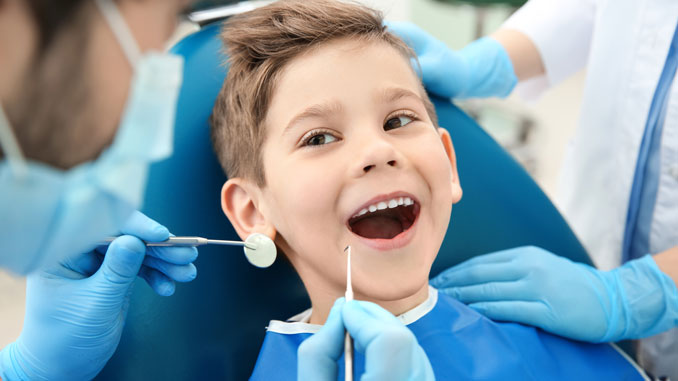
Experts weigh in on oral health, from newborns to baby boomers
From a young age, kids begin to learn the importance of brushing their teeth and having a healthy smile. As adults, our smiles are linked to our confidence. So why is it so important to see a dentist regularly and why does oral health and hygiene so often fall through the cracks? It doesn’t matter if you’re 90 days old or 90 years old, it’s never too late to fix your smile, and it’s certainly never too late to become an advocate for your child’s smile, too.
Pregnancy
Did you know that a healthy mouth starts before a baby is even born? A mother’s habits during her pregnancy can have lasting effects on a child’s oral health. Not to mention, oral care habits during pregnancy have a profound effect on a mother’s oral health, too. The fluctuations in hormones can make pregnant women more susceptible to gum and bone disease, and problems in the mouth can lead to pre-term delivery or a baby with low birth weight. So, what can you do about it? Make sure to get regular dental checkups during pregnancy, report any new symptoms, and eat a healthy diet with plenty of calcium to support healthy bones and teeth for your baby.
 Kids
Kids
One of the most important things to remember about proper dental care for kids is to start early. The Academy of Pediatric Dentistry recommends a child’s first dental visit no later than age one or six months after the eruption of their first tooth. After that, regular checkups are recommended.
A big reason for that first appointment is educating the parents and teaching them about preventative care. Not all parents understand the importance of caring for a child’s mouth even before teeth erupt because they don’t understand the science behind cavities and tooth decay. A child who drinks breast milk or formula still needs to have their gums and any visible teeth wiped down with a washcloth or an age-appropriate toothbrush-like device.
Too many parents live by the notion that baby teeth aren’t important because they fall out, but that couldn’t be further from the truth. “Baby teeth are important for growth and development,” says Dr. Rafat S. Razi, a pediatric dentist in Tracy. “They provide space for permanent teeth. Healthy baby teeth provide [a] pathway for healthy permanent teeth.”
Dr. Pankaj Patel, DMD, and owner of Salida Surgery Center, warns against feeding young kids too much juice or other sugary beverages. This can lead to bottle rot, where the four front upper teeth decay due to the sugars in the milk or other beverages being given.
Baby teeth remain in a kid’s mouth until about age 13. The front ones come out sooner, but the molars and other teeth in the back are part of a child’s mouth for a long time, making it even more important to take care of them.
At Salida Surgery Center kids come in for full mouth restorations, sometimes addressing 15-20 cavities at once.
“The most common thing is that parents aren’t brushing the teeth of these kids,” Dr. Patel explains.
As parents it’s important to watch for signs that your child could have cavities or other oral issues. Dr. Razi says to look for pain, discomfort while eating or drinking, and waking in the middle of the night. Parents also may be able to see visible decay, swelling, redness, and loose teeth if they look closely. These are all potential signs of an oral problem that needs professional attention so if you do spot any of these symptoms, contact a kooringal Dentist (or a local dentist) for advice.
Dr. Patel adds that children may not always be able to express what pain they are feeling and the signs could be less obvious. For example, a picky eater could have an unhealthy mouth. Sometimes kids will insist they do not like foods because they associate eating them with pain.
For kids who have significant dental issues, Salida Surgery Center in Salida offers a solution. The typical patient at Salida is between the ages of two and 17 and they need a lot of work done. The surgery center refers to its procedures as full mouth restorations or complete oral dental restorations. In many cases this means working on 15-20 cavities at a time, or completing several extractions at once.
The goal at Salida is to do all of the work in one appointment. This streamlines the care process and keeps kids from coming in again and again to address serious oral issues. It’s also all done under general anesthesia so kids aren’t awake for the procedures, which can be lengthy. And to help calm their fears, the parents are allowed to hold their children while they fall asleep.
As kids grow they will meet many oral milestones. One of the most exciting milestones is losing that first tooth, and the subsequent teeth after. Other kids may loose that first tooth through an extraction, but there are still ways to make it special. Celebrate the milestone with a fun ritual to make positive oral memories for your child. The more good things you can associate with oral care, the more positive feelings your child will have toward it as they grow.
Another important milestone is independence. As children get older they will become able to take care of their own teeth. This doesn’t mean parents should take a backseat to oral care. It is still important to schedule regular check-ups, remind children to brush and floss, and to monitor oral care to ensure children are doing a thorough job. Proper diet is another big part of oral care. Kids who eat too many sugary or acidic foods that could erode their teeth are doing long-term damage to their mouths. Encourage healthy eating and plenty of low- or no-sugar snacks. If your child likes gum, opt for a sugar-free brand and always avoid over-serving soda, juice, or other sugary beverages.
Sometimes it’s the simplest gesture that can make all of the difference. For example, most dental offices hand out free toothbrushes, toothpaste, and floss at every check-up. For families that are strapped for cash, this could mean a child gets their own toothbrush or gets a new toothbrush for the first time, practices that are imperative for supporting oral health.
 Smile Aesthetics for Kids
Smile Aesthetics for Kids
Keeping a mouth healthy is important and it lends to having a beautiful smile in the long run. Some kids, especially those with severe crowding or spacing or jaw discrepancies such as an under bite or overbite, may lack confidence in their smile. Luckily, these issues can typically be righted through orthodontics, but sometimes kids have to wait until their bones mature or their permanent teeth come in to undergo these treatments.
Talk with children about the importance of liking themselves and try to instill a sense of self-confidence in them. These issues are temporary, but if kids don’t like their smiles it can affect other parts of their social lives. Under no circumstance, however, should kids under the age of 13 get their teeth professionally bleached. While a whiter smile may sound like a confidence-booster, abrasive bleaching materials can cause serious sensitivities.
At Dr. Cameron Wheeler’s Stockton office Wheeler Orthodontics, he puts a lot of braces on kids. There are misconceptions that having braces can break a child’s confidence. Dr. Wheeler, however, says his experience shows the opposite to be true. “We have had patients tell us that getting braces is an answer to his/her prayer, because they hated to even smile for pictures or for friends, and we would even see sometimes they would hide the teeth and smile behind their hand,” Some families don’t even question how much do braces cost because they just want to feel happy and confident in their smile. Dr. Wheeler shares. “But once their teeth started to line up, you could easily see their confidence grow exponentially.”
Adults
One of the chief complaints from adults is that aesthetically they do not like their smile, but the reasons why are vast. While some patients complain of crooked teeth, stained or yellowed teeth, or chipped teeth, misalignment plagues others. In other cases poor oral health leads to smile insecurities, bleeding gums, or complaints about chronic bad breath. In each case, the adult that is experiencing any of these may wish to visit an orthodontist for cosmetic dentistry so they can feel confident with their smile once more.
Dr. Maywell L. Inong, DDS, a practicing dentist in Stockton, said one of the most common complaints she gets from adult patients is about gum recession. This causes several problems with aesthetics including that teeth look darker at the gum line, food gets caught in teeth more easily, and teeth appear long. To fix the aesthetics associated with gum recession, Dr. Inong offers patients gum grafts to cover the root surfaces as well as bonding or crowns to restore the worn tooth structure.
Most important, patients should address the cause behind gum recession. Poor oral hygiene can lead to excessive or early gum recession.
While aesthetics are important, the most important part of good oral care is oral health. “Many patients are unaware of the relation between oral health and their overall health,” Dr. Inong shares. “Patients don’t realize that the bacteria in the mouth can effect other parts of the body.” In fact, studies have shown a correlation between oral health and diabetes, heart disease, and pre-term pregnancy. “It is important for patients with these health issues to see their dentist on a regular basis.”
Routine cleanings, x-rays, and check-ups are the key to preventative care. If a dentist sees a patient often, they can catch potential problems before they escalate because a patient may not realize they have tooth decay, cavities, plaque build-up, or other potentially harmful issues until they see a professional.
Are You Afraid of the Dentist?
Whether you have dental fear, dental anxiety, or dental phobia, it’s important you don’t let that problem get in the way of seeing a dentist. By delaying visits and relying on symptom-driven treatment, you are only exacerbating the problem. Not only are you more likely to suffer serious dental problems as a result of skipping appointments, but also having an unhealthy mouth makes those rare visits less pleasant and only leads to additional fear and discomfort about seeing the dentist in the future.
“There are several ways we help patients with dental anxiety, such as utilizing new injection techniques, providing medication for anxiety, and gentle patient care,” Dr. Inong says. The goal is to get the patient in the chair regardless of their fears about seeing the dentist. By taking anti-anxiety medication before an appointment and being honest with your dentist about your fears, treatments can become more tolerable, especially over time.
Orthodontics For All Ages
Orthodontics means more than just braces, and every age group has their own unique orthodontic needs. Dr. Wheeler treats patients age six-85 in his office. “The basic truth is teeth can move at any age, so it is never to late,” Dr. Wheeler says.
At a young age, the focus is on maximizing space in the child’s mouth to allow teeth to grow in well. When permanent teeth come in to an overcrowded mouth, problems occur. When proper room has been made through braces or extractions it enhances facial harmony and helps the patient to achieve functional and aesthetic ideals.
Most people head to an orthodontist when their child is ready for braces, but the truth is you should seek out an orthodontist anytime you see a problem on the horizon. An orthodontist should screen all children by age seven to start putting together a care plan. Most patients won’t need orthodontic care that young, but because this is the time when the permanent incisors are erupting, clues on how the remaining teeth and jaw will develop are evident at this time. “If significant discrepancies are seen, early, interceptive treatment can be initiated to address those concerns before they develop into complicated problems later,” Dr. Wheeler explains.
As adults, orthodontics can fix teeth for both function and aesthetics. Teeth keep moving even after braces, so even if a person has had braces in the past they may need orthodontic intervention later in life, as well.
The number one complaint Dr. Wheeler says he hears from adult patients is about having crowded or misaligned teeth that continue to get worse overtime. Their crowded teeth often lead to other issues like insufficient brushing and flossing, gum problems and recession, chips and abnormal wear, and muscle and joint discomfort. The second biggest complaint is that they didn’t take care of the problem sooner.
Adults have many more options for care than kids do with treatment plans ranging from very limited and short-term, such as aligning rotated teeth or fixing gaps, to providing full comprehensive treatment addressing multiple concerns and issues.
It is important for adult orthodontic patients to be honest and realistic about their expectations, sharing this information with their orthodontist. “Together we can work to formulate the best possible, tailored-fit plan,” Dr. Wheeler says. “Explore your options and find out what can be achieved.”

